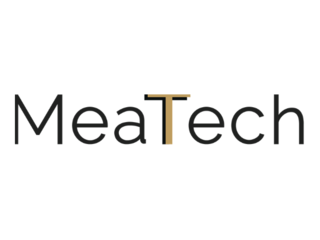
Mycoprotein, also known as mycelium-based protein or fungal protein, is a form of single-cell protein derived from fungi for human consumption.

A meat alternative or meat substitute, is a food product made from vegetarian or vegan ingredients, eaten as a replacement for meat. Meat alternatives typically approximate qualities of specific types of meat, such as mouthfeel, flavor, appearance, or chemical characteristics. Plant- and fungus-based substitutes are frequently made with soy, but may also be made from wheat gluten as in seitan, pea protein as in the Beyond Burger, or mycoprotein as in Quorn.

Cultured meat, also known as cultivated meat among other names, is a form of cellular agriculture where meat is produced by culturing animal cells in vitro. Cultured meat is produced using tissue engineering techniques pioneered in regenerative medicine. Jason Matheny popularized the concept in the early 2000s after he co-authored a paper on cultured meat production and created New Harvest, the world's first non-profit organization dedicated to in-vitro meat research. Cultured meat has the potential to address the environmental impact of meat production, animal welfare, food security and human health, in addition to its potential mitigation of climate change.

Bruce Gregory Friedrich is co-founder and president of The Good Food Institute (GFI), a Y Combinator funded non-profit that promotes plant- and cultivated meat alternatives to conventional animal meat. He is also a co-founder of the alternative protein venture capital firm New Crop Capital. Friedrich previously worked for PETA and Farm Sanctuary.
Industrial fermentation is the intentional use of fermentation in manufacturing processes. In addition to the mass production of fermented foods and drinks, industrial fermentation has widespread applications in chemical industry. Commodity chemicals, such as acetic acid, citric acid, and ethanol are made by fermentation. Moreover, nearly all commercially produced industrial enzymes, such as lipase, invertase and rennet, are made by fermentation with genetically modified microbes. In some cases, production of biomass itself is the objective, as is the case for single-cell proteins, baker's yeast, and starter cultures for lactic acid bacteria used in cheesemaking.

Biobased economy, bioeconomy or biotechonomy is economic activity involving the use of biotechnology and biomass in the production of goods, services, or energy. The terms are widely used by regional development agencies, national and international organizations, and biotechnology companies. They are closely linked to the evolution of the biotechnology industry and the capacity to study, understand, and manipulate genetic material that has been possible due to scientific research and technological development. This includes the application of scientific and technological developments to agriculture, health, chemical, and energy industries.
New Harvest is a donor-funded research institute dedicated to the field of cellular agriculture, focusing on advances in scientific research efforts surrounding cultured animal products. Its research aims to resolve growing environmental and ethical concerns associated with industrial livestock production.

Nick Cooney is a managing partner at Lever VC, an investment fund focused on alternative protein companies.
Cellular agriculture focuses on the production of agricultural products from cell cultures using a combination of biotechnology, tissue engineering, molecular biology, and synthetic biology to create and design new methods of producing proteins, fats, and tissues that would otherwise come from traditional agriculture. Most of the industry is focused on animal products such as meat, milk, and eggs, produced in cell culture rather than raising and slaughtering farmed livestock which is associated with substantial global problems of detrimental environmental impacts, animal welfare, food security and human health. Cellular agriculture is a field of the biobased economy. The most well known cellular agriculture concept is cultured meat.

Cellular Agriculture Society is a lobby organization. It is an international 501(c)(3) organization based in Miami, created in 2017 to research, fund and advance cellular agriculture.
Aleph Farms is a cellular agriculture company active in the food technology space. It was co-founded in 2017 by the Israeli food-tech incubator "The Kitchen Hub" of Strauss Group Ltd., and Prof. Shulamit Levenberg of the Faculty of Biomedical Engineering at Technion – Israel Institute of Technology and is headquartered in Rehovot, Israel.

Perfect Day, Inc. is a food technology startup company based in Berkeley, California, that has developed processes of creating dairy proteins, including casein and whey, by fermentation in microbiota, specifically from fungi in bioreactors, instead of extraction from bovine milk.

BioTech Foods is a Spanish biotechnology company dedicated to the development of cultured meat from the cultivation of muscle cells previously extracted from animals.
ProVeg International is a non-governmental organisation that works in the field of food system change and has ten offices globally. The organisation's stated mission is to reduce the consumption of animal products by 50% by 2040, to be replaced by plant-based or cultured alternatives. Instead of increasing the share of vegetarians and vegans, ProVeg's focus is on reducing animal product consumption in the general population.

Isha Datar is the executive director of New Harvest, known for her work in cellular agriculture, the production of agricultural products from cell cultures.

The EVERY Company is an American biotechnology company that develops proteins and other products traditionally sourced from animals. It does this by using yeast to convert sugar into proteins that are similar to those found in animals and animal products.
ProVeg Incubator is a business incubator based in the Tiergarten district of Berlin, Germany. It was established in 2018 as part of the wider ProVeg International non-governmental organisation.

MeaTech 3D Ltd., or MeaTech for short, is a company which develops 3D bioprinting technologies for usage in cellular agriculture. Based in Israel, it has a Belgian subsidiary called Peace of Meat, with which it produces cultured meat, with a focus on cultivating foie gras.
Mirai Foods is a food technology company which produces cultivated meat from beef cells. It is headquartered in Wädenswil in the canton of Zurich in Switzerland, and was founded in 2019.
Elizabeth Anne Specht is an American research scientist who is Vice President for Science and Technology at The Good Food Institute. She leads the development of a roadmap for the acceleration of alternative protein research. In 2022, Vox named her in one of their "Future Perfect 50".












